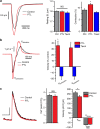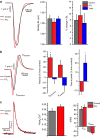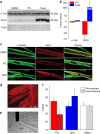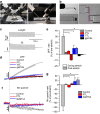Detyrosinated microtubules modulate mechanotransduction in heart and skeletal muscle
- PMID: 26446751
- PMCID: PMC4633818
- DOI: 10.1038/ncomms9526
Detyrosinated microtubules modulate mechanotransduction in heart and skeletal muscle
Abstract
In striated muscle, X-ROS is the mechanotransduction pathway by which mechanical stress transduced by the microtubule network elicits reactive oxygen species. X-ROS tunes Ca(2+) signalling in healthy muscle, but in diseases such as Duchenne muscular dystrophy (DMD), microtubule alterations drive elevated X-ROS, disrupting Ca(2+) homeostasis and impairing function. Here we show that detyrosination, a post-translational modification of α-tubulin, influences X-ROS signalling, contraction speed and cytoskeletal mechanics. In the mdx mouse model of DMD, the pharmacological reduction of detyrosination in vitro ablates aberrant X-ROS and Ca(2+) signalling, and in vivo it protects against hallmarks of DMD, including workload-induced arrhythmias and contraction-induced injury in skeletal muscle. We conclude that detyrosinated microtubules increase cytoskeletal stiffness and mechanotransduction in striated muscle and that targeting this post-translational modification may have broad therapeutic potential in muscular dystrophies.
Conflict of interest statement
B.L.P. and C.W.W. hold a US patent for MyoTak adhesive (patent number US 20120034620 A1), licensed to IonOptix LLC. C.W.W. holds a US patent for microtubule-targeted interventions for the muscular dystrophies (patent number US 2014015664 A1). The remaining authors declare no competing financial interests.
Figures









References
-
- Nat. Rev. Mol. Cell Biol. 10, 1–1 (2009).
Publication types
MeSH terms
Substances
Grants and funding
LinkOut - more resources
Full Text Sources
Other Literature Sources
Molecular Biology Databases
Miscellaneous

